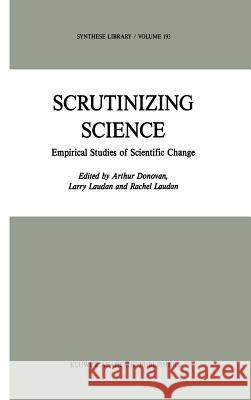Scrutinizing Science: Empirical Studies of Scientific Change » książka
topmenu
Scrutinizing Science: Empirical Studies of Scientific Change
ISBN-13: 9789027726087 / Angielski / Twarda / 1988 / 382 str.
Kategorie BISAC:
Wydawca:
Kluwer Academic Publishers
Seria wydawnicza:
Język:
Angielski
ISBN-13:
9789027726087
Rok wydania:
1988
Wydanie:
1988
Numer serii:
000037621
Ilość stron:
382
Waga:
1.67 kg
Wymiary:
23.5 x 15.5
Oprawa:
Twarda
Wolumenów:
01











